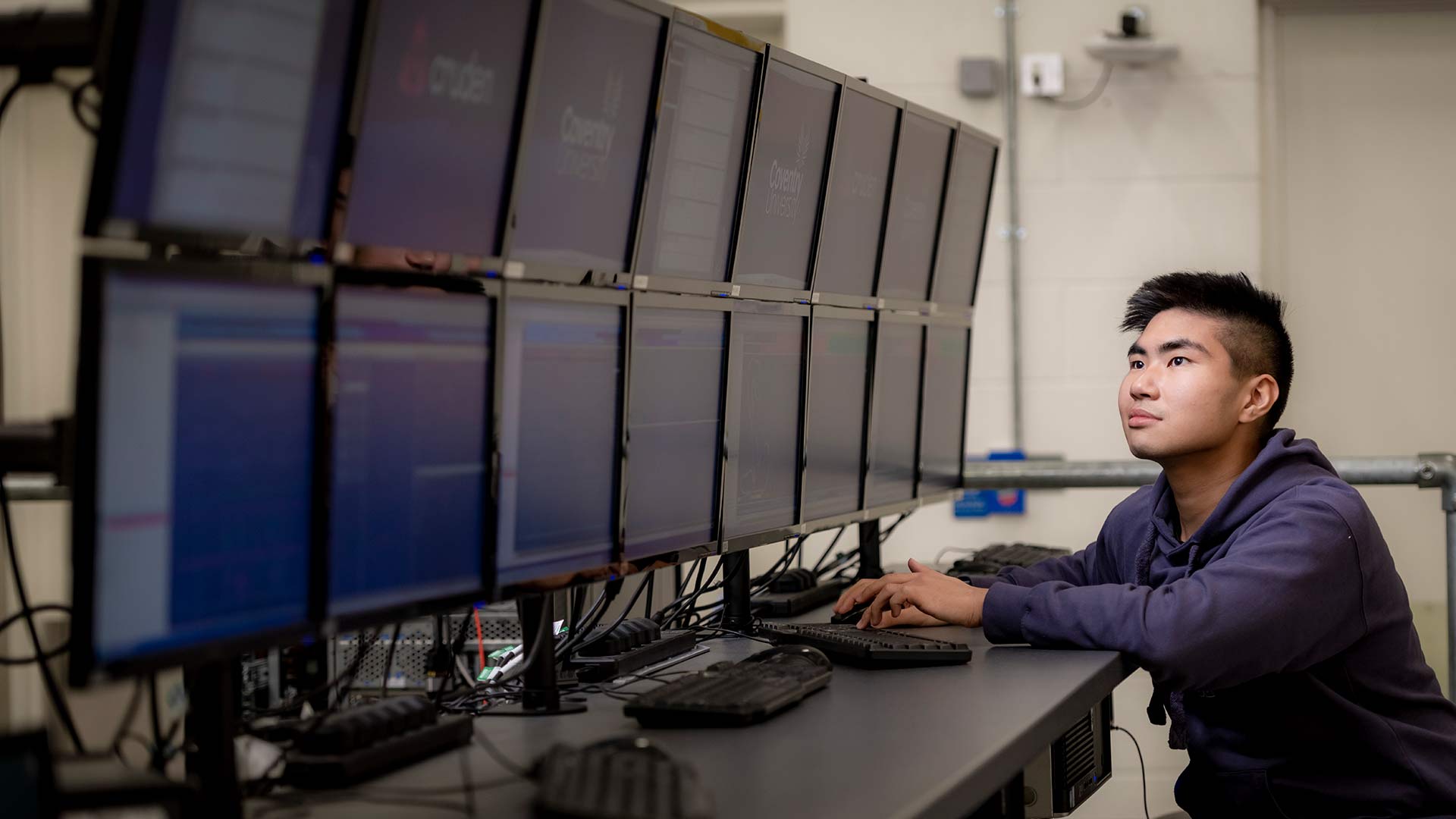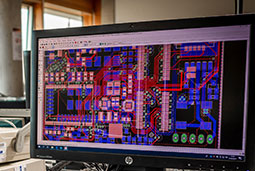Search
Computer Systems Engineering MEng/BEng (Hons)
Study level: Undergraduate
Computer System Engineering is a contemporary course that has been developed to equip students with the knowledge and skills needed to design and build hardware and software for computer systems.
Course option
Year of entry
Location
Coventry University (Coventry)
Study mode
Full-time
Sandwich
Duration
BEng:3 years full-time4 years sandwich
MEng:4 years full-time5 years sandwich
UCAS codes
GG56 / G410
Start date
September 2025
The information on this page is for 2024-25 entry and should be used as guidance for 2025-26 entry. Please keep checking back on this course page to see our latest updates.
Course overview
This course focuses on the engineering and integration of hardware and software systems. The course encourages you to think creatively and independently and aims to prepare you to meet the challenges of the rapidly changing technological environment.
- This course is specially designed to bridge the gap between electronics/hardware engineering and computer science/software engineering.
- The course covers many aspects of software while focusing on the advanced hardware design based on field-programmable gate array (FPGA) and system design based on microcontroller.
- This course aims to provide you with the knowledge and skills necessary to tackle challenges involved in the development of future technologies such as Internet of Things (IoT), smart cities, autonomous cars and green technologies.
Joint Top Modern University for Career Prospects
Guardian University Guide 2021 and 20225 QS Stars for Teaching and Facilities
QS Stars University RatingsTop 5 UK Student City (Coventry)
QS Best Student Cities Index 2023Why you should study this course
- Well-equipped electronics laboratory to build electronic prototype4.
- Explore latest networking and security protocols in a modern CISCO laboratory4.
- Placement opportunities within a range of UK industries2.
- Opportunities to gain international experience through field trips and the Collaborative International Online Learning (COIL) program2.
What you'll study
We regularly review our course content, to make it relevant and current for the benefit of our students. For these reasons, course modules may be updated.
How you'll learn
Learning will be facilitated through a variety of methods which may include lectures, seminars, lab, workshops, online activities and group work. Students are expected to engage in both class and online activities and discussions. The course also requires students to participate in additional guided reading and self-directed study to reinforce the learning gained from timetabled sessions.
A portion of contact time will be dedicated to course support sessions. The course support sessions are weekly, timetabled sessions where you can explore areas of the course you find challenging, or get support with personal projects and employability efforts.
Teaching contact hours
We understand that everyone learns differently, so each of our courses will consist of structured teaching sessions, which can include:
- On campus lectures, seminars and workshops
- Group work
- Self-directed learning
- Work placement opportunities2.
If you would like more information, you can request information about teaching hours.
Part of university life is undertaking self-directed learning. During a typical week you will have time that allows you to work independently to apply the skills and knowledge you have learnt in taught or facilitated sessions to your projects or assignment briefs. This self-directed learning allows you to use your research skills, consolidate your knowledge or undertake collaborative group work.
As an innovative and enterprising institution, the university may seek to utilise emerging technologies within the student experience. For all courses (whether on-campus, blended, or distance learning), the university may deliver certain contact hours and assessments via online technologies and methods.
Since COVID-19, we have delivered our courses in a variety of forms, in line with public authority guidance, decisions, or orders and we will continue to adapt our delivery as appropriate. Whether on campus or online, our key priority is staff and student safety.
Assessment
This course will be assessed using a variety of methods which will vary depending upon the module.
Assessment methods include:
- Formal examinations
- Phase tests
- Essays
- Group work
- Presentations
- Reports
- Projects
- Coursework
- Exams
- Individual assignments
- Laboratories
- Posters
The Coventry University Group assessment strategy ensures that our courses are fairly assessed and allows us to monitor student progression towards achieving the intended learning outcomes.
International experience opportunities
Computer Systems Engineering is an international business, so we encourage a global perspective throughout our teaching.
Entry requirements
Typical offer for 2025/26 entry.
Not got the required grades? We offer this degree with an integrated foundation year.
Fees and funding
| Student | Full-time | Part-time |
|---|---|---|
| UK, Ireland*, Channel Islands or Isle of Man | 2025/26 fees TBC 2024/25 fees - £9,250 per year |
Not available |
| EU | 2025/26 fees TBC 2024/25 fees - £9,250 per year with EU Support Bursary** 2025/26 fees TBC 2024/25 fees - £19,850 per year without EU Support Bursary** |
Not available |
| International | 2025/26 fees TBC 2024/25 fees - £19,850 per year |
Not available |
If you choose to study this course with a professional placement2 or study abroad year, you will need to pay a tuition fee3 of £1,250 to cover your academic support throughout your placement year.
For advice and guidance on tuition fees and student loans visit our Undergraduate Finance page and see the university’s Tuition Fee and Refund Terms and Conditions.
The university will charge the tuition fees that are stated in the above table for the first Academic Year of study. The university will review tuition fees each year. For UK (home) students, if Parliament permits an increase in tuition fees, the university may increase fees for each subsequent year of study in line with any such changes. Note that any increase is expected to be in line with inflation.
For international students, we may increase fees each year, but such increases will be no more than 5% above inflation. If you defer your course start date or have to extend your studies beyond the normal duration of the course (e.g. to repeat a year or resit examinations) the university reserves the right to charge you fees at a higher rate and/or in accordance with any legislative changes during the additional period of study.
We offer a range of International scholarships to students all over the world. For more information, visit our International Scholarships page.
Tuition fees cover the cost of your teaching, assessments, facilities and support services. There may be additional costs not covered by this fee such as accommodation and living costs, recommended reading books, stationery, printing and re-assessments should you need them.
The following are additional costs not included in the tuition fees:
- Any optional overseas field trips or visits: £400+ per trip.
- Any costs associated with securing, attending or completing a placement (whether in the UK or abroad).
Find out what's included in your tuition costs.
*Irish student fees
The rights of Irish residents to study in the UK are preserved under the Common Travel Area arrangement. If you are an Irish student and meet the residency criteria, you can study in England, pay the same level of tuition fees as English students and utilise the Tuition Fee Loan.
**EU Support Bursary
Following the UK's exit from the European Union, we are offering financial support to all eligible EU students who wish to study an undergraduate or a postgraduate degree with us full-time. This bursary will be used to offset the cost of your tuition fees to bring them in line with that of UK students. Students studying a degree with a foundation year with us are not eligible for the bursary.
Facilities
The School of Future Transport Engineering is based in the Engineering and Computing Building, and the attached Beatrice Shilling Building. Both buildings are high-specification learning environments, which benefit from extensive social learning facilities, well-appointed laboratories, lecturing facilities and classrooms, facilitating our innovative teaching methods across a diverse suite of undergraduate and postgraduate courses4.
Electronics lab
Four industry-standard electronic labs are equipped with modern facilities for electronic design, prototyping, test and measurements.
Cisco lab
The Cisco lab is used for working with general networking and towards accreditation by Cisco. Optional modules allow students to work in the lab to develop skills in preparation for the Cisco certification exam.
Manufacturing facility
This facility is equipped with 3-D printers and PCB manufacturing machines. This also has a separate area for soldering training.
Careers and opportunities
On successful completion, you will be able to:
- Demonstrate knowledge and understanding of computer systems and computer networking; digital electronics, microcomputers, computer systems hardware; operating systems, network security and software; mathematical principles necessary to underpin the discipline; management of engineering including social, environmental, economic, legal and ethical topics.
- Solve engineering problems employing a system approach.
- Design software and hardware for application-specific purposes.
- Design computer systems and networks.
- Search and evaluate information sources.
- Adopt a holistic approach to using computer hardware and software technology in a commercial context.
- Use electrical and electronic test equipment in experimental work.
- Implement and test software solution.
- Simulate computer systems and protocols.
- Apply computer technology, software tools and quantitative methods.
- Configure and connect electronic and computer systems.
- System on Chip (SoC) design.
- Very Large Scale Integrated Circuit (VLSI) design.
Opportunities exist throughout the world for highly trained professionals who combine computing and engineering skills.
The course focuses on computer hardware-software design and integration, giving you the opportunity to gain substantial practical experience, which aims to support you in demonstrating your capabilities to potential future employers upon successful completion.
Course content is regularly reviewed to reflect what is relevant and in demand in the industry. We seek external feedback from the External Examiner and a current group of professionals and subject experts from industry, universities and the Institution of Engineering and Technology (IET).
Where our graduates work
Previous graduates from similar courses have gone into roles in a diverse range of industries, for example, JLR, GE and National Grid, Jaguar Land Rover, Blackberry, IBM, DSTL – Defence Science and Technology Laboratory, Advanced Electronics Company, Ultra Electronics Sonar Systems, PX Group and more. Some choose to progress to further study of an MSc or PhD.
Further study
You can choose to continue your studies at Coventry University with the Embedded System Engineering MSc. You may be entitled to an alumni discount on your fees if you decide to extend your time with us by progressing from undergraduate to postgraduate study.
Graduate Immigration Route visa
Based on current information from the UK Government, international students whose study extends beyond summer 2021 may be eligible for a visa under the UK Government’s Graduate Immigration Route, which will enable students to stay and work, or look for work, in the UK at any skill level for up to two (2) years. Check the most up to date guidance available to check your eligibility and any updates from the UK Government before making an application or enrolment decision.
How to apply
You may also like




